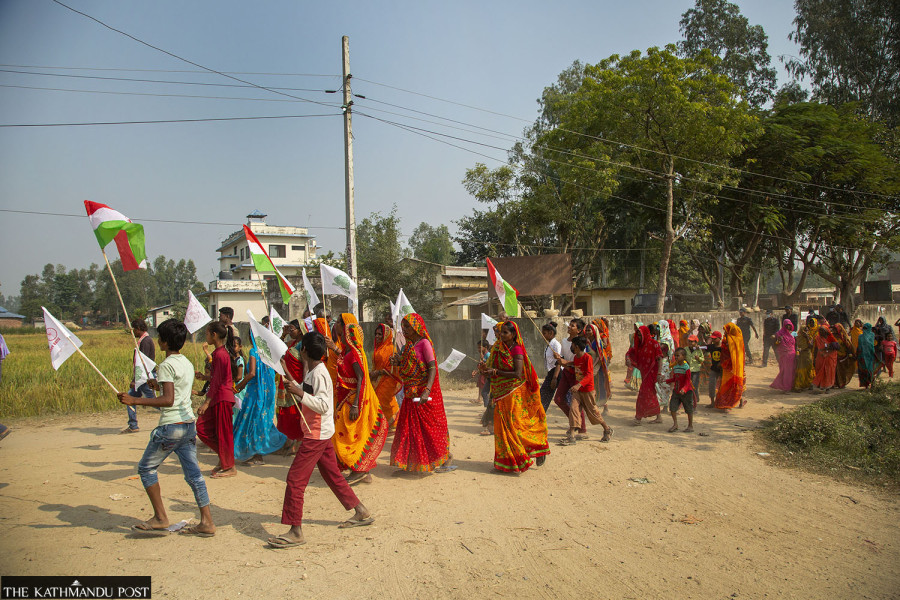Politics
Identity politics going through a churn
The November elections were not in favour of the parties that have long relied on it.
Binod Ghimire
Identity-based politics in Nepal has gone through several ups and downs over the years. It all started in 1985, with the launch of the Nepal Goodwill Council by the late Gajendra Narayan Singh. The organisation was later converted into a political force—Nepal Sadbhavana Party—in 1990. The party took new heights in the late 2000’s.
The twin Madhesh uprisings of 2007 and 2008 forced Kathmandu to embrace federalism and broaden the scope of inclusion. The movement, staged for the rights of the people living in the plains, was led by Upendra Yadav under the banner Madheshi Janadhikar Forum Nepal. The protests in the plains brought the issues of Madheshi people, who for decades faced the state’s discrimination, into the mainstream.
The protest not just established Yadav’s party as the fourth-largest political force by giving it 52 seats in the 601-strong first Constituent Assembly in 2008, it also helped other regional parties—the Tarai Madhesh Loktantrik Party and Sadbhavana Party—carrying identity-related agendas to win a sizeable number of seats.
The parties had a strong say in constitution-drafting. However, their strength waned significantly in the second Constituent Assembly elected in 2013. Because, first, the parties had split into different fringe forces and, second, they were more involved in power games than in institutionalising the issues concerning Madhesh.
“Identity politics has gone through ups and downs mainly because of the inconsistent actions of the parties championing it,” Vijay Kant Karna, a professor of political science at Tribhuvan University, told the Post. He said the people have rewarded the parties when they worked to establish the agenda of marginalised and deprived communities.
The regional parties fared better in the 2017 general elections, which came on the heels of their protests against the Constitution of Nepal saying that it didn’t address the issues of the Madheshi people. The Sanghiya Samajbadi Forum Nepal, led by Yadav, secured 16 seats while the Mahantha Thakur’s Rastriya Janata Party won 17 seats. The two parties jointly had an overwhelming majority in Madhesh Province where they led the coalition government from 2018.
In April 2020, both parties merged to form Janata Samajbadi Party meanwhile enjoying a comfortable majority in the Madhesh Assembly. However, in July 2021, the Mahantha Thakur-led faction split from JSP to form Loktantrik Samajbadi Party. The faction was subsequently ousted from the provincial government in Madhesh.
The November 2022 elections were not in their favour. The Janata Samajbadi Party won just 12 seats with the support of the CPN-UML, while the Loktantrik Samajbadi Party has been reduced to a mere four seats.
“It is true that identity-based politics has declined and yet it retains its significance,” said Karna. “The ground for identity politics will remain fertile so long as the issues of marginalised communities remain unaddressed.”
In the view of observers, Madheshi parties were penalised in recent elections as voters were fed up with the parties’ hunger for power. Yadav’s party, for instance, joined the KP Sharma Oli government in 2018, and it was also a part of the Sher Bahadur Deuba government formed in July 2021.
While the strengths of the two established regional parties faded, the election has given birth to two new parties—the Janamat Party and Nagarik Unmukti Party—one of which carries the agenda of the Tharu people. Nagarik Unmukti Party led by Ranjita Shrestha, the wife of Resham Chaudhary, didn’t just fare well in Lumbini and Sudur Paschim, it also made its presence felt in Madhesh.
The party, formed a few months before the local elections in May, has won four seats in the House of Representatives. “The Tharu people hope that the party will raise their concerns, which have remained dormant for decades,” Hari Chandra Kamali, an associate professor at Sudur Paschim University, told the Post. “I see the party emerging as one of the largest regional forces in a few years. However, much will depend on the party’s performance in the next five years.”
Some leaders who earlier embraced identity politics now argue that identity politics is outdated, as the 2015 constitution addressed the issues of marginalised communities. “The constitution has guaranteed reservations [for the marginalised] in politics and the state machinery. We have federal structures in place. These are the outcomes of identity politics,” Raj Kumar Lekhi, a former chair of the Nepal Federation of Indigenous Nationalities and now a UML leader, told the Post. “Now, our focus should be on securing our past achievements while also working for development and prosperity. I don’t think the parties that solely depend on identity politics for votes are going to fare well from now on. The issue is outdated.”
But Karna disagrees. He said the marginalised communities are still sidelined by the state and their voices continue to be ignored. “Identity-based politics will remain relevant so long as the dominance of certain communities in governance continues,” he added.




 11.12°C Kathmandu
11.12°C Kathmandu















